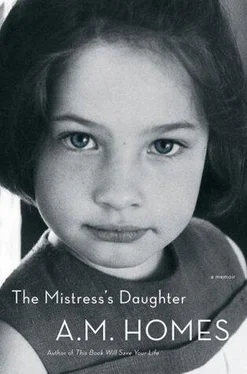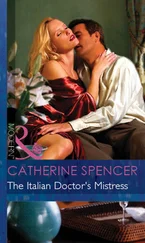I say good night and drift off into the spin of the story, the myth of my beginning.
My adoptive mother and father didn’t marry until my father was forty. My mother, eight years younger, had a son, Bruce, from a previous marriage who had been born with severe kidney problems. He lived to be nine and died six months before I was born. Together my mother and father had Jon — during his birth my mother’s uterus ruptured, and both she and Jon nearly died. An emergency hysterectomy was performed and my mother was unable to have more children.
“It was lucky any of us survived,” she said. “We always wanted more. We wanted three children. We wanted a little girl.”
When I was young and used to ask where I came from, my mother would tell me that I was from the Jewish Social Service Agency. When I was a teenager, my therapist often asked me, “Don’t you think it’s odd that an agency would give a baby to a family where another child had died just six months before — to a family still in mourning?” I shrugged. It seemed like both a good idea and a really bad one. I always felt that my role in the family was to heal things, to make everything all right — to replace a dead boy. I grew up doused in grief. From day one, on a cellular level, I was perpetually in mourning.
There is folklore, there are the myths, there are facts, and there are the questions that go unanswered.
If my parents wanted more children, why did they build a house with only three bedrooms — who was going to share? I assumed that they knew Bruce was going to die. They may have wanted three children, but they planned for two.
When I asked my mother why an agency would give them an infant so soon after a child had died, she said nothing. And then when I was twenty, on a cold winter afternoon, I pressed her for more information, details. I would do this at weak moments, special occasions such as Bruce’s birthday, the anniversary of his death, or my birthday — times when she seemed vulnerable, when I sensed a crack in the surface. Where did I come from? Not from an agency, but through a lawyer; it was a private adoption.
“We put our name on agency lists but there were no babies available. We were told that the best thing to do was ask around, to let people know that we were looking for a baby.”
Each earthquake of identity, each shift in the architecture of the precarious frame that I’d built for myself, threw me. How much was still being kept from me and how much had been forgotten, or lost with the subtle erasure, the natural revision of time?
I asked again. “Where did I come from?”
“We told everyone that we were looking for a baby and then one day we heard of a baby that was going to be born, and that was you.”
“How did you hear about me?”
“Through a friend. Remember my friend Lorraine?” She mentioned the name of someone I met once, long ago. Lorraine knew another couple that also wanted to adopt a baby, but it turned out that in a roundabout way they knew who the mother was — this was told to me as though it explained something, as though knowing who the mother was made everything null and void, not because there was something wrong with the mother, but because there was something wrong with knowing.
As an adult I asked my mother if she would call Lorraine, if she would ask Lorraine to call the people who in a roundabout way knew who my mother was and ask them, who was she? My mother said no. She said, what if the couple has other children that don’t know they’re adopted?
What does that have to do with me? And how incredibly screwed up that someone wouldn’t have told their children that they were adopted.
My mother finally called Lorraine — who said, “Let it go.” She claimed to know nothing. Who was she protecting? What was she hiding?
My mother remembered something about real estate, something about a name, but she didn’t remember enough. Why didn’t she remember? It would seem like the kind of thing you wouldn’t forget.
“I didn’t want to remember. I didn’t want to know anything. I felt I had to protect you. The less I knew, the better. I was afraid she would come back and try to take you away.”
“Okay, back to the beginning — you heard of a baby who was going to be born, and then what?”
“And then PopPop’s lawyer was able to get in touch with the woman and they met and he called us and said, she’s wonderful, she’s healthy, except for some problems with her teeth — I think she hadn’t had good dental care. We set up a post office box and some letters were exchanged, and then we waited for you to be born.”
“What did the letters say?”
“I don’t remember.” Everything is prefaced with “I don’t remember.”
I lean in and the subtle pressure causes some slight discharge of information. “Just some basic information about her background, about her health, about how the pregnancy was going. She was young, she wasn’t married. I think that the father was married. One of them was Jewish; the other, I think, may have been Catholic. She cared about you very much, she wanted what was best for you and knew she couldn’t take care of you herself. She wanted you to go to a very special home — a Jewish home. It was important to her to know that you went somewhere where you’d be loved. She wanted you to have all the opportunity in the world. I think she may have been living in northern Virginia.”
“What happened to the letters?” I imagine a precious short stack of delicate letters tied in a ribbon and buried at the back of a drawer deep in my mother’s dresser.
My mother pauses, looks up and off to the side, as if searching her memory. “I think there was even another letter after you were born.”
“Where are the letters?”
“I think they were destroyed,” my mother says.
“Didn’t it occur to you that I might want them, that they might be all I ever had?”
“We were told to be very careful. I didn’t save anything. We were told not to. No evidence, no reminders.”
“Who told you?”
“The lawyer.”
I didn’t believe her. It was her choice. My mother didn’t want me to be adopted. She wanted me to be hers. She was afraid of anything that challenged that.
“And then what?”
“We waited. And on December 18, 1961, we got a phone call from the lawyer saying, ‘Your package has arrived, it’s wrapped in pink ribbons and it has ten fingers and ten toes.’ We called Dr. Ross, our pediatrician, and he went down to the hospital, took a look at you, and called us. ‘She’s perfect,’ he said.”
“What else?”
“Three days later we went to pick you up.”
I met my parents for the first time in a car parked around the corner from the hospital. They sat parked on a street in downtown Washington in the middle of a snowstorm, waiting for me to be delivered to them. They brought clothing to dress me, to disguise me, to begin to make me their own. This undercover pickup and delivery was made by a friend who purposely dressed in ratty old clothes — her costume designed not to attract attention, not to give information; this is another detail I didn’t know until I was in my twenties. My parents sat in the car, worrying, while the neighbor went into the hospital to collect me. This was a secret mission, something could go wrong. She —the mother — could change her mind. They sat waiting, and then the neighbor was there walking through the snow with a bundle in her arms. She handed me to my mother, and my parents brought me home, mission accomplished.
I have only the home movie version in my head. A big old-fashioned 1961 car. Downtown Washington. Snow. Nervousness. Excitement.
The story goes that my brother, Jon, so proud, so thrilled that the new baby was coming home, stood out in the driveway with a sign that he and my grandmother had made—“Welcome Home Baby Sister.” My arrival has always been described as if it were some magical moment, as if a fairy had waved a wand that pronounced the household cured, leaving me there, like a token, a good luck charm to fix everything, to lift a mother and father from their grief.
Читать дальше












